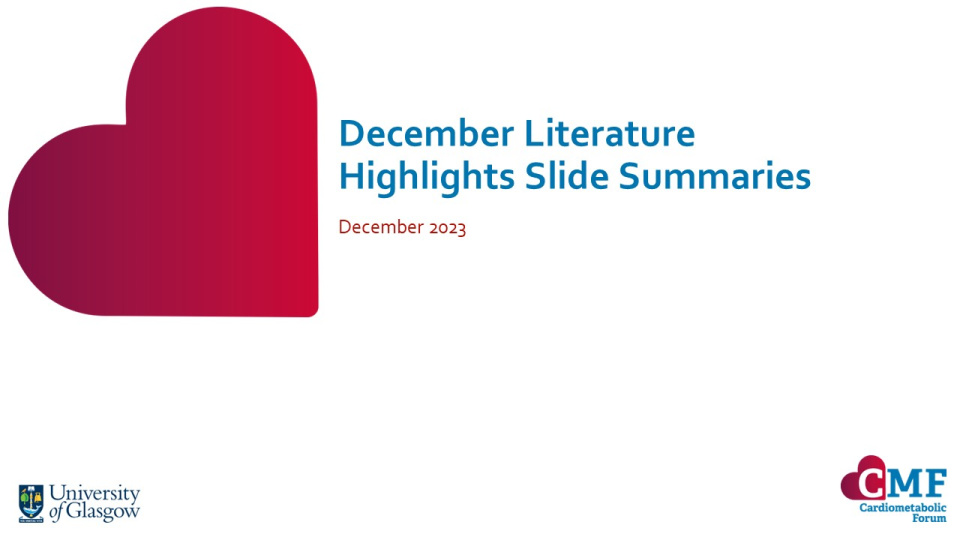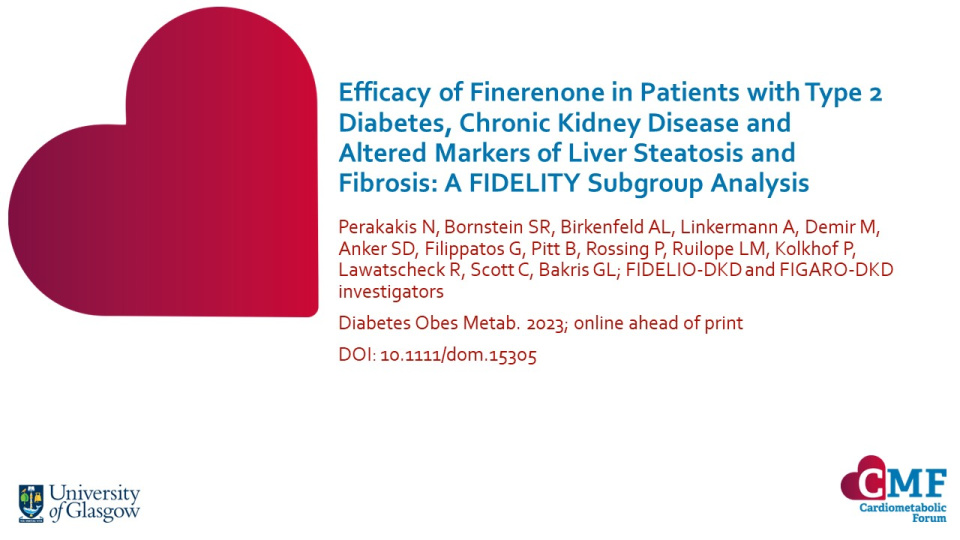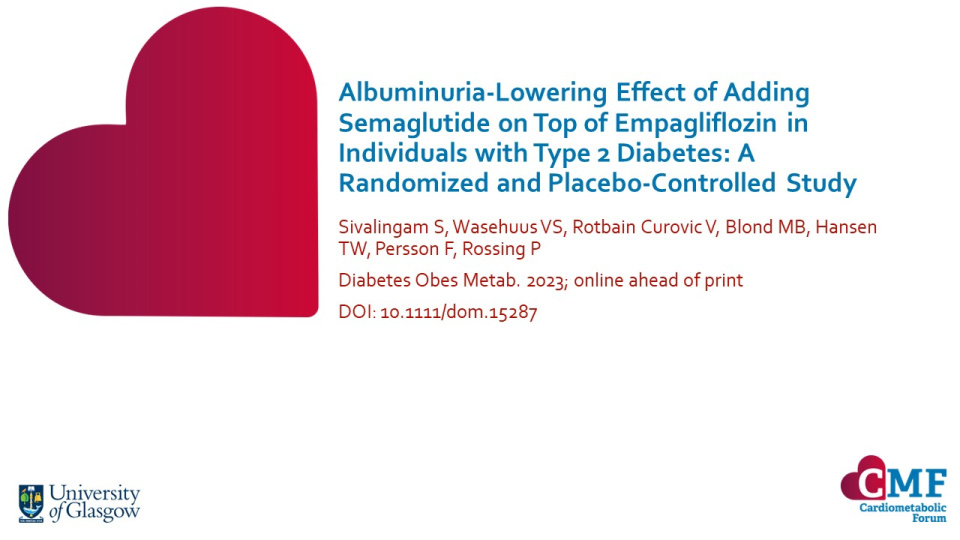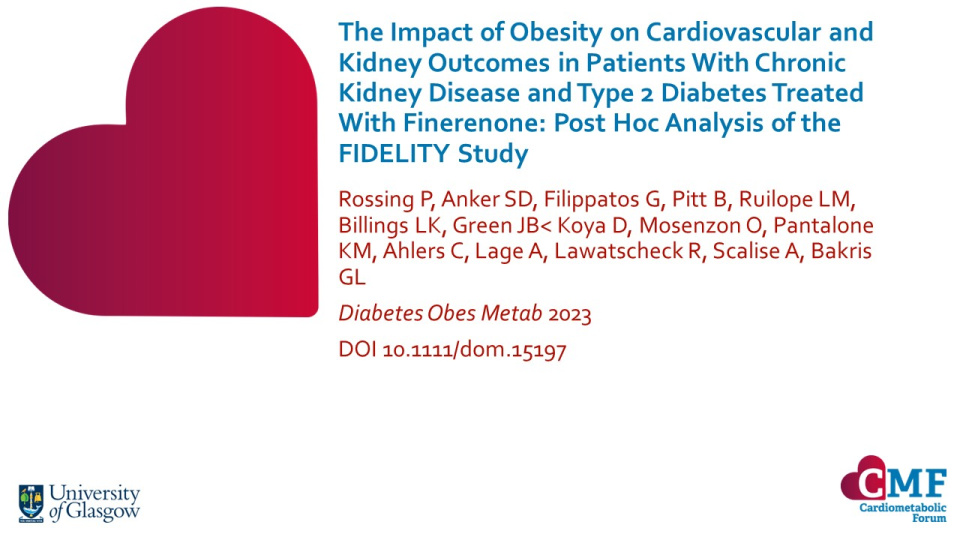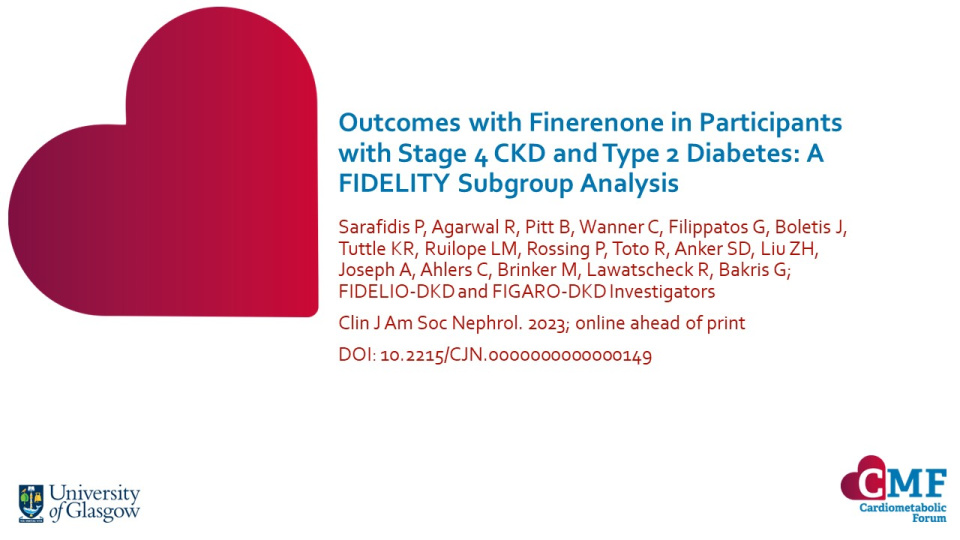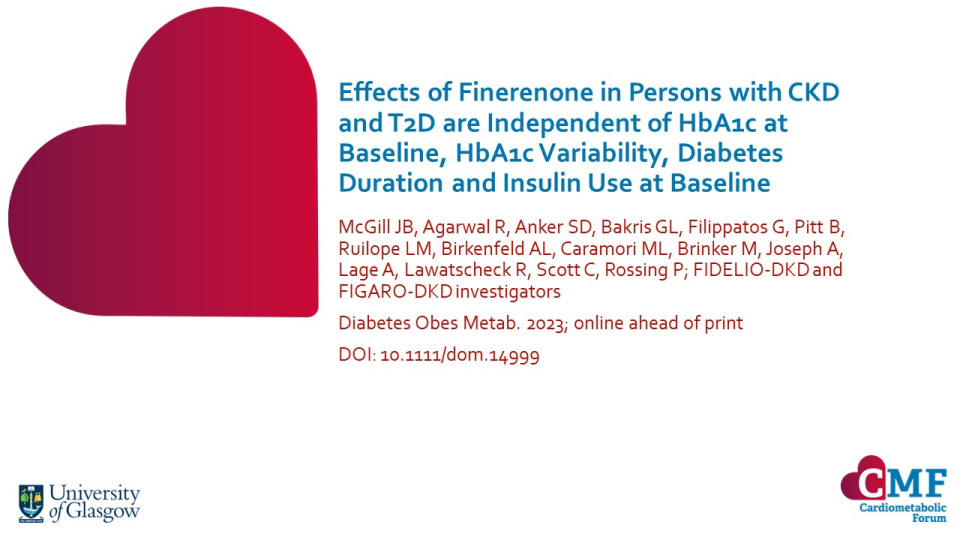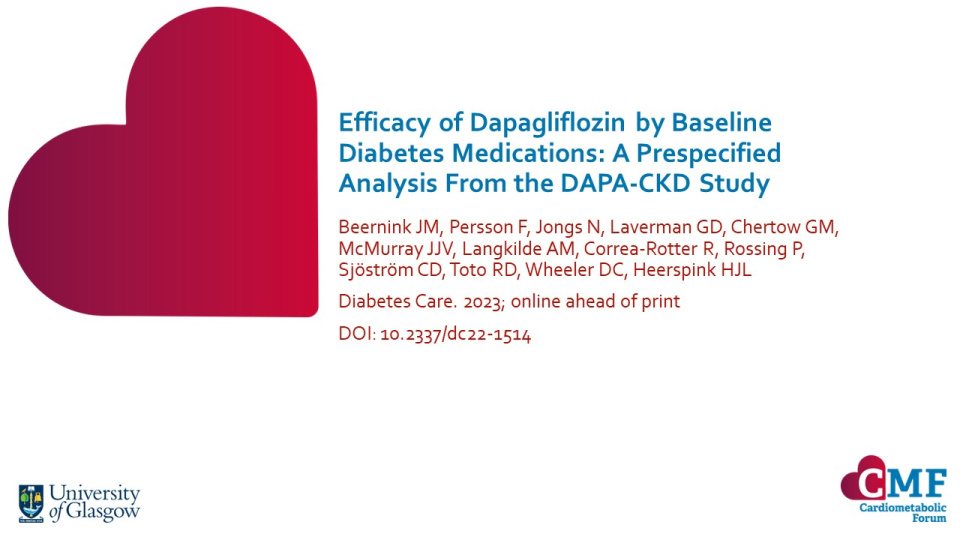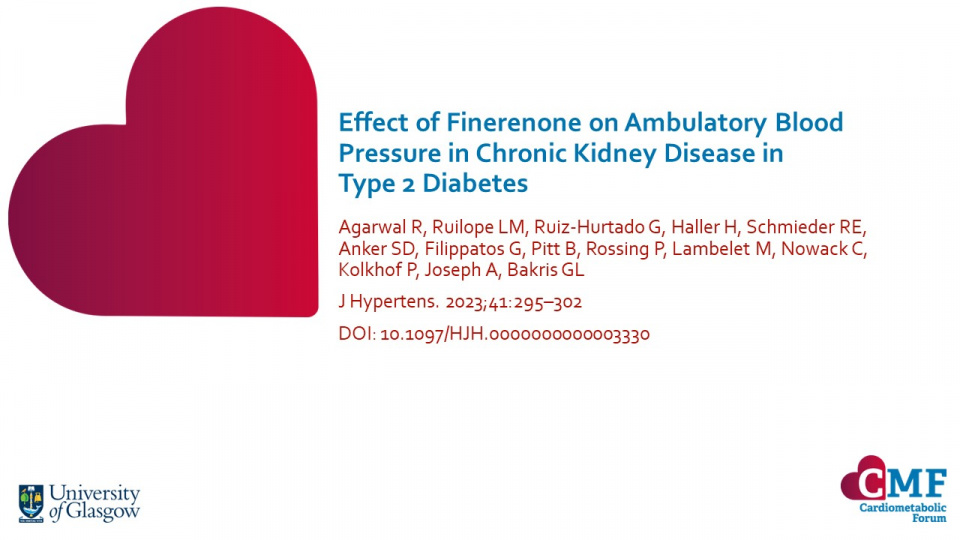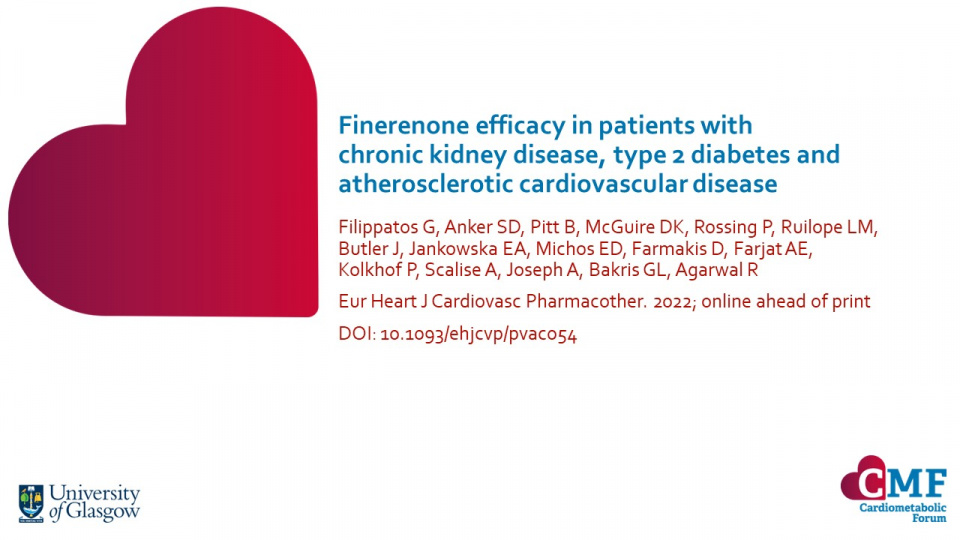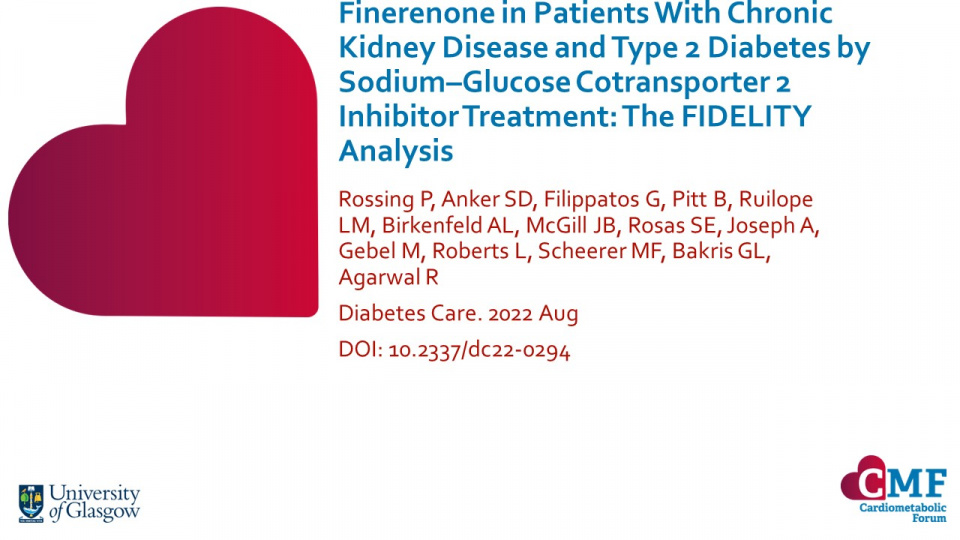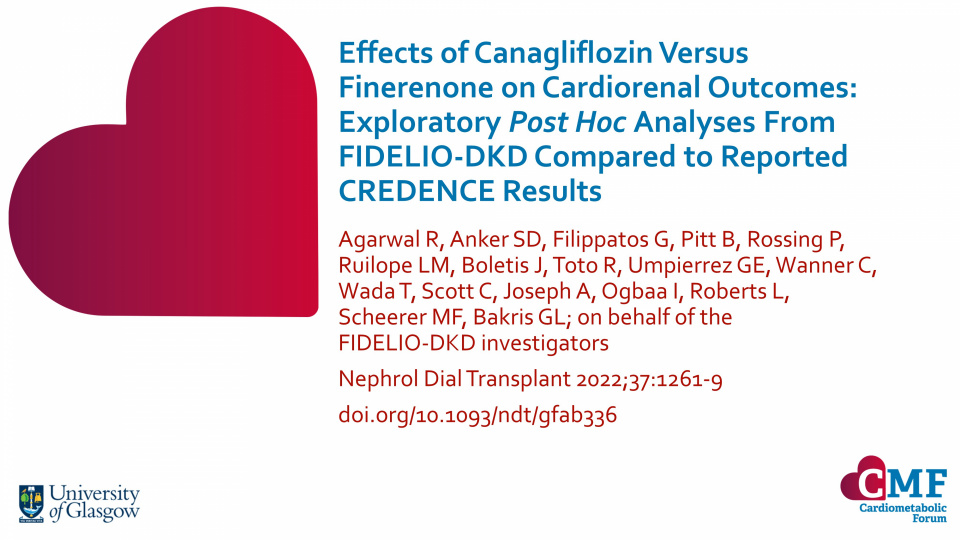Publications
Stay up to date with our literature reviews which are curated by experts to feature the most important publications released each month. Explore our publications for access to concise summary slides for your own use.
Efficacy of Finerenone in Patients with Type 2 Diabetes, Chronic Kidney Disease and Altered Markers of Liver Steatosis and Fibrosis: A FIDELITY Subgroup Analysis
Diabetes Obes Metab. 2023; online ahead of print DOI: 10.1111/dom.15305
This post hoc subgroup analysis from FIDELITY investigated the effect of finerenone on liver function, cardiovascular and kidney composite outcomes in patients with CKD and T2D, stratified by their risk of liver steatosis, inflammation and fibrosis.
Keywords:
Albuminuria-Lowering Effect of Adding Semaglutide on Top of Empagliflozin in Individuals with Type 2 Diabetes: A Randomized and Placebo-Controlled Study
Diabetes Obes Metab. 2023; online ahead of print DOI: 10.1111/dom.15287
The proposed different mechanisms of SGLT2i and GLP-1RAs indicate that combination therapy may have additive or synergistic effects on the kidneys. This placebo-controlled, double-blind, parallel-group study investigated the effect on albuminuria of adding semaglutide to ongoing treatment with empagliflozin compared with empagliflozin alone in 60 individuals with T2D and albuminuria.
Keywords:
The Impact of Obesity on Cardiovascular and Kidney Outcomes in Patients with Chronic Kidney Disease and Type 2 Diabetes Treated with Finerenone: Post hoc analysis of the FIDELITY Study
Diabetes Obes Metab. 2023 doi Epub ahead of print : 10.1111/dom.15197
Patients with obesity may benefit more from treatment with mineralocorticoid receptor antagonists given their higher levels of circulating aldosterone and therefore potentially higher levels of MRs in visceral fat. The aim of this analysis was to assess the effect of finerenone on the risk of cardiovascular and kidney outcomes in patients with chronic kidney disease and type 2 diabetes, with and without obesity.
Keywords:
Outcomes with Finerenone in Participants with Stage 4 CKD and Type 2 Diabetes: A FIDELITY Subgroup Analysis
Clin J Am Soc Nephrol. 2023; online ahead of print DOI: 10.2215/CJN.0000000000000149
Patients with stage 4 CKD and T2D have limited treatment options to reduce their persistent CV and kidney risk. This post hoc analysis of the FIDELITY database evaluated the effect of finerenone vs placebo in 890 patients with stage 4 CKD and T2D.
Keywords:
Effects of Finerenone in Persons with CKD and T2D are Independent of HbA1c at Baseline, HbA1c Variability, Diabetes Duration and Insulin Use at Baseline
Diabetes Obes Metab. 2023; online ahead of print DOI: 10.1111/dom.14999
Given the role of HbA1c, diabetes duration and insulin use in determining morbidity and mortality of CKD in T2D, it is important to investigate whether these factors modify the efficacy and safety of therapies that mitigate the cardiorenal impact of CKD in T2D. This post hoc analysis of the FIDELITY database evaluated the effect of finerenone by baseline HbA1c, HbA1c variability, diabetes duration and baseline insulin use on cardiorenal outcomes and diabetes progression.
Keywords:
Efficacy of Dapagliflozin by Baseline Diabetes Medications: A Prespecified Analysis From the DAPA-CKD Study
Diabetes Care. 2023; online ahead of print DOI: 10.2337/dc22-1514
Achieving optimal glucose control can be challenging in patients with T2D and CKD because impaired kidney function hampers the use of several oral or injectable glucose-lowering therapies (GLTs) and increases the likelihood of hypoglycaemia. This prespecified analysis from the DAPA-CKD trial evaluated whether the benefits of dapagliflozin in patients with T2D and CKD varied by background GLT number or class.
Keywords:
Effect of Finerenone on Ambulatory Blood Pressure in Chronic Kidney Disease in Type 2 Diabetes
J Hypertens. 2023;41:295–302 DOI: 10.1097/HJH.0000000000003330
It has been postulated that the effects of finerenone on cardiorenal outcomes may be mediated primarily via non-haemodynamic pathways, but office BP measurements are insufficient to fully assess haemodynamic effects. A substudy of the ARTS-DN phase IIb trial was conducted to obtain further insights into the mechanism of action of finerenone by analysing 24-h ambulatory BP in patients with CKD and T2D.
Keywords:
Finerenone efficacy in patients with chronic kidney disease, type 2 diabetes and atherosclerotic cardiovascular disease
Eur Heart J Cardiovasc Pharmacother. 2022; online ahead of print DOI: 10.1093/ehjcvp/pvac054
Finerenone reduced the risk of CV and kidney outcomes consistently across the spectrum of CKD in patients with T2D, irrespective of prevalent ASCVD.
Finerenone in Patients With Chronic Kidney Disease and Type 2 Diabetes by Sodium–Glucose Cotransporter 2 Inhibitor Treatment: The FIDELITY Analysis
Diabetes Care 2022; online ahead of print doi: 10.2337/dc22-0294
In the FIDELITY analysis, finerenone reduced the risk of cardiovascular and kidney outcomes compared with placebo. Concomitant treatment with a sodium-glucose cotransporter-2 inhibitor (SGLT2i) did not modify the observed benefits.
FIDELITY pooled populations from the FIDELIO-DKD and FIGARO-DKD studies in order to examine the effect of finerenone and interaction with SGLT2i use on prespecified outcomes in patients with chronic kidney disease (CKD) and type 2 diabetes (T2D). In both trial, use of SGLT2i was permitted at baseline, as was initiation of SGLT2i at any time during the trial.
Effects of Canagliflozin Versus Finerenone on Cardiorenal Outcomes: Exploratory Post Hoc Analyses From FIDELIO-DKD Compared to Reported CREDENCE Results
Nephrol Dial Transplant 2022;37:1261-9 doi.org/10.1093/ndt/gfab336
This analysis highlights the pitfalls of direct comparisons between trials, since when key differences in design are considered, FIDELIO-DKD and CREDENCE demonstrate similar cardiorenal benefits. The authors conclude that both canagliflozin and finerenone are similarly effective in reducing the risk of cardiorenal outcomes.

